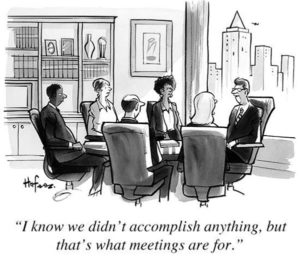Zoom, Teams, phone, or in person?
Imagine yourself with a calendar requiring you to be in six meetings in a day. Day after day. It doesn’t matter whether you’re required to be there in person or virtually, you get worn out after a few of these. Your attention span sorely reduces to nil, and your quality of input and insights fall as the long day progresses.
When to call it a day and become personally productive?
How long would it take to induce you to rethink your use of time – and that of the others Zooming, phoning, Teaming, sitting (or standing) beside you? More important, how long would it take to realize that there is something wrong with the enterprise when it takes constant meetings to get the job done?
Slowly in many cases. And expensive.
The best performers and managers dislike meetings and show their disdain by being abrupt or at the opposite end, distracted. Often the most attentive ones involved in constant meetings are those who feel protected, shielded from measurement of personal performance, or at times less self–motivated to perform.
And the cost to the company of those meetings?
Staggering, if you take into account the lost production time of those present, not just the salary cost.
And yet, there are times when co–ordination between people and groups requires a meeting, whether in person or over those digital channels.
So, let’s examine ways to make meetings more efficient – those that are actually required.
[Email readers, continue here…] The concept of a scrum is a good one to use in many cases of immediate need to coordinate a working group. In the office conference room, attendees stand rather than sit, reinforcing the urgency and need for a short meeting. Leaders of virtual meetings reinforce the urgency by keeping those anxious to elaborate in check.
The purpose of the Scrum
Individuals address issues that are blocking them from completing their tasks, requesting help from others in removing the blockage. Scrums are effective and should be short, scheduled, and supervised.
Board meetings are often killers.
 Hardeners of the arteries of progress. Most devolve into a series of reports from each constituency, spewing facts that could have been printed and passed to the board ahead of time. Board meetings should revolve around issues, not progress. Reviewing sales account by account is not an effective use of a board’s collective time. Attacking critical issues after providing background information and perhaps a list of alternatives is a good use of board time.
Hardeners of the arteries of progress. Most devolve into a series of reports from each constituency, spewing facts that could have been printed and passed to the board ahead of time. Board meetings should revolve around issues, not progress. Reviewing sales account by account is not an effective use of a board’s collective time. Attacking critical issues after providing background information and perhaps a list of alternatives is a good use of board time.
And the ultimate alternative?
If there is little to discuss, perhaps the wisest decision of all is to just cancel the meeting and bank the time saved for more critical use. Certainly, most of us would applaud the decision to return a bit of lost time to its rightful owners. And to avoid the occasional (slow) death by meeting, so common in companies today.






Hello Dave,
This is an amazing article and I totally agree the best option of all is to cancel the meeting.
I also love how you connected the improvement of meeting efficiency back to Scrum practices.
Our startup has been experimenting with applying your wisdom to sales and software teams:
https://blog.pixelmixer.com/how-pixelmixer-empowers-high-performance-software-development-teams/#aync-communication
I will certainly be re-sharing this insightful article with others on social media.